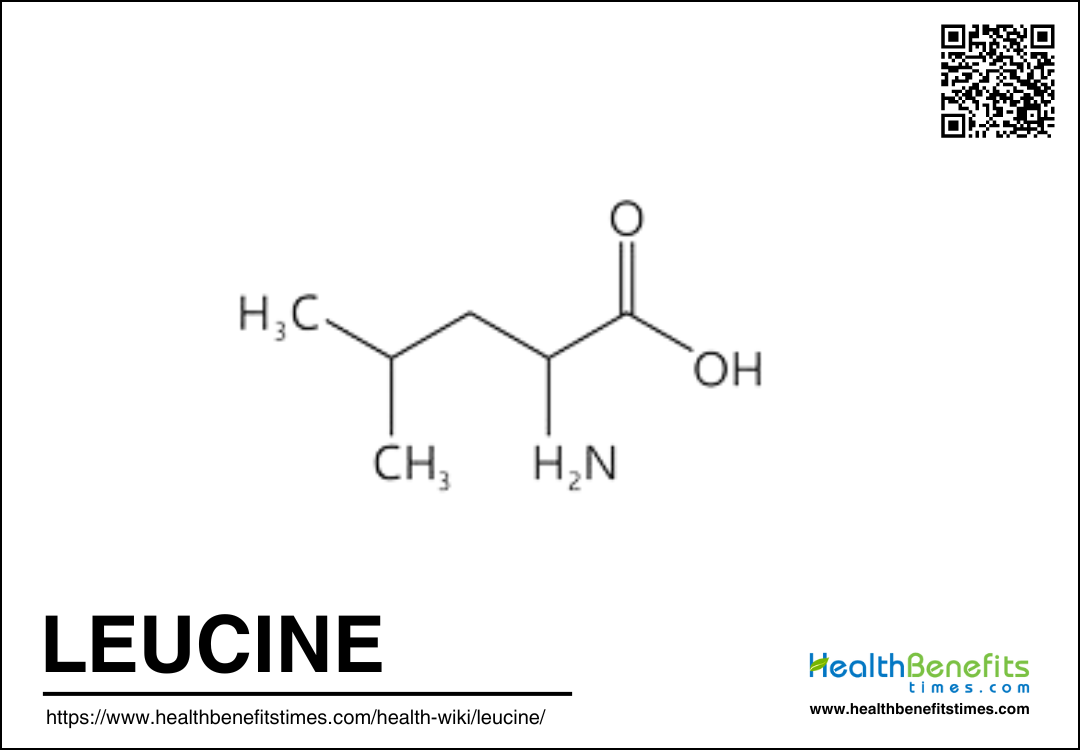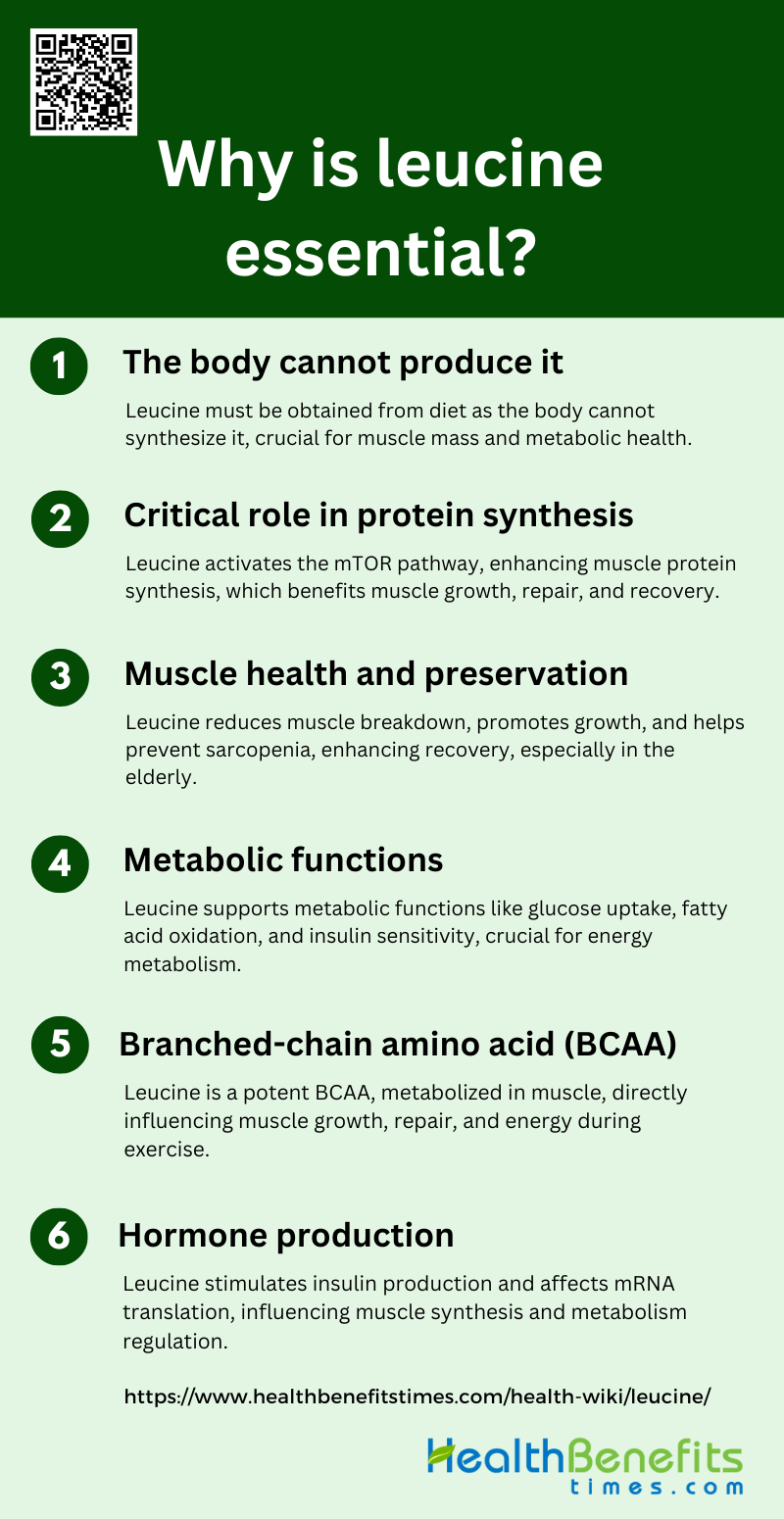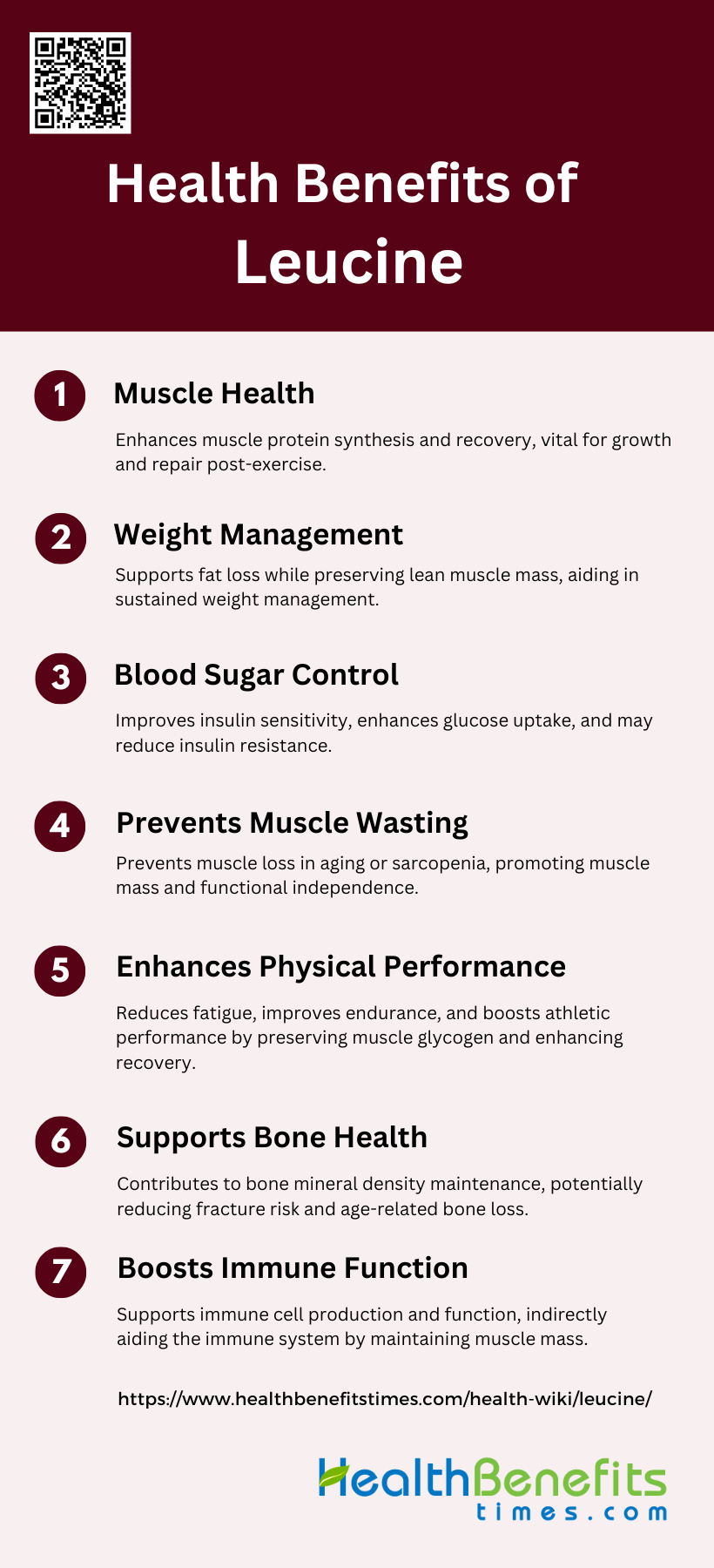Leucine is an essential amino acid that plays a crucial role in various biological functions within the body. It is one of the three branched-chain amino acids (BCAAs), along with isoleucine and valine. Leucine is particularly important for protein synthesis and muscle growth, making it a key nutrient for maintaining and building muscle mass. This amino acid also serves as a signaling molecule in metabolic pathways, particularly in the regulation of protein synthesis through the activation of the mammalian target of rapamycin (mTOR) pathway. Leucine is considered “essential” because the human body cannot produce it on its own, meaning it must be obtained through dietary sources or supplements. In addition to its role in muscle health, leucine has been studied for its potential benefits in various health conditions, including liver diseases like alcoholic cirrhosis.
Why is leucine essential?
1. The body cannot produce it
Leucine is classified as an essential amino acid because the human body cannot synthesize it. This means that it must be obtained through diet. Essential amino acids are crucial for various bodily functions, and their absence can lead to significant health issues. Leucine, in particular, plays a vital role in protein synthesis and muscle repair, making it indispensable for maintaining muscle mass and overall metabolic health. The inability of the body to produce leucine underscores the importance of consuming adequate amounts through dietary sources such as meat, dairy products, and legumes.
2. Critical role in protein synthesis
Leucine is pivotal in stimulating protein synthesis, primarily through the activation of the mammalian target of rapamycin (mTOR) signaling pathway. This pathway is crucial for muscle protein synthesis, which is essential for muscle growth and repair. Studies have shown that leucine can enhance protein synthesis in skeletal muscle, adipose tissue, and even placental cells. This anabolic effect is particularly beneficial for athletes, elderly individuals, and those recovering from muscle damage or surgery. The ability of leucine to promote protein synthesis makes it a key nutrient for maintaining and building muscle mass.
3. Muscle health and preservation
Leucine plays a significant role in muscle health and preservation. It helps in reducing muscle protein breakdown and promotes muscle protein synthesis, which is essential for muscle growth and repair. This is particularly important for aging adults, who are at risk of sarcopenia, a condition characterized by the loss of muscle mass and function. Leucine supplementation has been shown to improve muscle recovery after exercise and enhance muscle protein synthesis in elderly individuals, thereby helping to maintain muscle mass and strength.
4. Metabolic functions
Leucine is not only crucial for protein synthesis but also plays a significant role in various metabolic functions. It enhances energy metabolism by promoting glucose uptake, mitochondrial biogenesis, and fatty acid oxidation. These metabolic activities are essential for providing the energy required for protein synthesis and other cellular functions. Leucine also improves insulin sensitivity and lipid metabolism, making it a promising nutrient for preventing and managing metabolic diseases such as type 2 diabetes and obesity. Its role in metabolic regulation underscores its importance in overall health and disease prevention.
5. Branched-chain amino acid (BCAA)
Leucine is one of the three branched-chain amino acids (BCAAs), along with isoleucine and valine. BCAAs are unique because they are primarily metabolized in the muscle rather than the liver. This unique metabolic pathway allows BCAAs to play a direct role in muscle protein synthesis and energy production during exercise. Leucine, in particular, is the most potent BCAA in stimulating the mTOR signaling pathway, which is crucial for muscle growth and repair. The combined effects of BCAAs make them essential for athletes and individuals looking to enhance muscle performance and recovery.
6. Hormone production
Leucine also influences hormone production, particularly insulin. It acts as a strong insulin secretagogue, meaning it stimulates the secretion of insulin when consumed with carbohydrates. This property is beneficial for improving postprandial glycemic control, which is crucial for managing blood sugar levels. Additionally, leucine’s ability to stimulate mRNA translation and increase muscle protein synthesis is partly mediated by its effects on insulin and other hormones. These hormonal interactions further highlight leucine’s multifaceted role in regulating metabolism and promoting muscle health.
Sources of Leucine
Leucine is an essential amino acid that plays a crucial role in protein synthesis and muscle repair. It cannot be produced by the body and must be obtained through diet. Here are some common sources of leucine:
1. Animal-Based Sources
Leucine is an essential amino acid predominantly found in animal-based foods. Meat, including beef, chicken, and pork, is particularly rich in leucine, making it a significant source for those who consume animal products. Fish such as salmon and tuna also provide high levels of leucine, contributing to their reputation as nutritious protein sources. Dairy products, including milk, cheese, and yogurt, are not only rich in calcium but also in leucine, supporting muscle protein synthesis. Eggs, another versatile and widely consumed food, offer a substantial amount of leucine, making them a valuable addition to a leucine-rich diet.
2. Plant-Based Sources
Plant-based sources of leucine include a variety of legumes, nuts, seeds, whole grains, and certain vegetables. Legumes such as lentils, chickpeas, and soybeans are particularly noted for their high leucine content, making them excellent alternatives to animal proteins. Nuts and seeds, including almonds and peanuts, also provide significant amounts of leucine, contributing to their nutritional value. Whole grains like quinoa and oats are not only rich in fiber but also in leucine, supporting a balanced diet. Additionally, vegetables such as spinach and peas offer leucine, although in smaller amounts compared to legumes and nuts.
3. Supplements
For those seeking targeted leucine intake, supplements are a convenient option. Leucine supplements, often available in powder or capsule form, provide a concentrated dose of this essential amino acid. Additionally, Branched-Chain Amino Acid (BCAA) supplements, which include leucine, isoleucine, and valine, are popular among athletes and individuals looking to enhance muscle recovery and growth. These supplements can be particularly beneficial for those who may not get enough leucine from their diet alone, ensuring they meet their nutritional needs effectively.
Health Benefits of Leucine
Leucine is a vital amino acid known for its numerous health benefits, particularly in muscle growth and repair. It aids in protein synthesis and helps regulate blood sugar levels. Here are some key health benefits of leucine:
1. Muscle Health
Leucine plays a crucial role in enhancing muscle protein synthesis and aiding in post-exercise recovery. This essential amino acid stimulates the mammalian target of rapamycin (mTOR) pathway, which is key to initiating muscle protein synthesis. Studies have shown that leucine-enriched essential amino acids can enhance post-exercise muscle recovery, independent of overall myofibrillar protein synthesis. In neonatal pigs, leucine pulses during continuous feeding have been found to enhance skeletal muscle protein synthesis, demonstrating its potential for promoting muscle growth and development.
2. Weight Management
Leucine contributes significantly to weight management by supporting fat loss while helping maintain lean muscle mass. As a branched-chain amino acid (BCAA), leucine promotes protein synthesis and prevents muscle breakdown, which is crucial for preserving metabolically active tissue during weight loss. By maintaining muscle mass, leucine helps sustain a higher resting metabolic rate, potentially aiding in long-term weight management. Additionally, leucine may help regulate appetite and food intake through its effects on hypothalamic neurons, potentially reducing overall calorie consumption and supporting weight loss efforts.
3. Blood Sugar Control
Leucine has shown promising effects on blood sugar control, potentially improving insulin sensitivity and offering benefits for individuals with diabetes. This amino acid stimulates insulin secretion from pancreatic beta cells, which can help lower blood glucose levels. Leucine also enhances glucose uptake in skeletal muscle cells, further contributing to improved glycemic control. Some studies suggest that leucine supplementation may help reduce insulin resistance, a key factor in type 2 diabetes. However, more research is needed to fully understand the long-term effects of leucine on blood sugar regulation and its potential as a therapeutic approach for diabetes management.
4. Prevents Muscle Wasting
Leucine plays a crucial role in preventing muscle wasting, particularly in elderly individuals or those with sarcopenia. Its anabolic properties stimulate muscle protein synthesis and inhibit protein breakdown, helping to maintain muscle mass and strength. Leucine activates the mTOR pathway, which is essential for muscle growth and regeneration. In older adults, leucine supplementation has been shown to enhance the muscle protein synthesis response to protein intake, potentially counteracting age-related muscle loss. This amino acid’s ability to preserve muscle mass is particularly important for maintaining functional independence and quality of life in aging populations.
5. Enhances Physical Performance
Leucine contributes significantly to enhancing physical performance by reducing muscle fatigue, improving endurance, and boosting overall athletic capacity. As a branched-chain amino acid, leucine helps preserve muscle glycogen stores during exercise, potentially delaying the onset of fatigue. It also promotes faster recovery by stimulating muscle protein synthesis post-exercise, allowing for quicker repair and adaptation of muscle tissue. Leucine’s role in maintaining and building lean muscle mass can lead to improved strength and power output. Additionally, its potential to enhance glucose uptake in muscles may contribute to better energy utilization during prolonged physical activities.
6. Supports Bone Health
Leucine plays a supportive role in maintaining bone health by contributing to the maintenance of bone mineral density and potentially reducing fracture risk. This essential amino acid stimulates protein synthesis in bone cells, promoting the formation of new bone tissue. Leucine also enhances calcium absorption in the intestines, ensuring an adequate supply of this crucial mineral for bone strength. Some studies suggest that leucine supplementation may help prevent age-related bone loss by suppressing bone resorption and stimulating bone formation. However, more research is needed to fully understand the extent of leucine’s benefits for bone health and its potential as a therapeutic approach for osteoporosis prevention.
7. Boosts Immune Function
Leucine contributes significantly to immune system health by supporting the production of proteins and antibodies essential for immune function. As a key component in protein synthesis, leucine helps in the formation of immune cells, antibodies, and other immune system components. It also plays a role in activating natural killer cells and lymphocytes, which are crucial for fighting off pathogens and abnormal cells. Leucine’s ability to enhance muscle protein synthesis may indirectly support immune function by maintaining muscle mass, which serves as a reservoir of amino acids that can be mobilized during immune responses. However, more research is needed to fully elucidate the mechanisms by which leucine influences immune function.
How to Incorporate Leucine into Your Diet
Tips on Incorporating Leucine-Rich Foods into Daily Meals
Incorporating leucine-rich foods into your daily meals can significantly enhance muscle protein synthesis, especially in older adults. Foods high in leucine include animal-based sources like lean meats, poultry, fish, eggs, and dairy products, as well as plant-based sources such as soy products, beans, lentils, and nuts. Adding a variety of these foods to your meals can ensure a balanced intake of leucine. For instance, you can include eggs or Greek yogurt for breakfast, a chicken or tofu salad for lunch, and a fish or lentil stew for dinner. Snacks like almonds or a protein shake can also help boost your leucine intake throughout the day.
Suggestions for Meal Plans that Include Both Animal-Based and Plant-Based Sources
Creating a meal plan that includes both animal-based and plant-based sources of leucine can provide a diverse range of nutrients. For breakfast, consider a smoothie made with Greek yogurt, spinach, and a handful of almonds. Lunch could be a quinoa salad with grilled chicken, black beans, and avocado. For dinner, a stir-fry with tofu, broccoli, and brown rice can be both satisfying and leucine-rich. Snacks might include a boiled egg or a handful of mixed nuts. This balanced approach ensures that you get the benefits of leucine from various sources, supporting muscle protein synthesis and overall health.
Recommendations for Leucine Supplements, if Necessary
If dietary intake alone is insufficient, leucine supplements can be a practical option. Studies have shown that leucine supplementation can enhance muscle protein synthesis and support muscle mass maintenance, particularly in older adults. A common recommendation is to take leucine supplements with meals to maximize their effectiveness. For instance, a leucine-enriched whey protein drink taken before breakfast has been shown to stimulate muscle protein synthesis and increase muscle mass over time. However, it is essential to consult with a healthcare provider before starting any supplementation to ensure it is appropriate for your individual health needs.
Potential Side Effects and Considerations of Leucine
While leucine is essential for various bodily functions, it is important to be aware of potential side effects and considerations. Excessive intake can lead to adverse effects, particularly in individuals with certain health conditions. Here are some potential side effects and considerations of leucine:
1. Hypoglycemia (Low Blood Sugar)
Leucine has been shown to influence blood glucose levels. In a study involving healthy men, intraduodenal infusions of leucine at higher doses slightly reduced blood glucose levels and increased plasma insulin concentrations, suggesting a potential for hypoglycemia. However, in individuals with type 2 diabetes, leucine did not significantly affect plasma glucose levels when administered before a carbohydrate-containing drink, indicating that its hypoglycemic effects may vary depending on the individual’s metabolic state. Therefore, while leucine can modulate blood sugar levels, its impact may be context-dependent.
2. Gastrointestinal Issues
Leucine can affect gastrointestinal functions, as evidenced by its ability to alter gut motility and hormone release. In a study with healthy men, higher doses of leucine decreased antral pressures and increased plasma cholecystokinin, which could potentially lead to gastrointestinal discomfort or altered digestive processes. However, these effects were not observed at lower doses, suggesting that gastrointestinal issues may be dose-dependent. Additionally, no significant effects on gastric emptying were noted in individuals with type 2 diabetes, indicating that the gastrointestinal impact of leucine may also depend on the health status of the individual.
3. Pellagra
High dietary intake of leucine has been linked to disturbances in the tryptophan-niacin pathway, which can contribute to the development of pellagra, a condition characterized by dermatitis, diarrhea, and dementia. This is particularly evident in populations consuming sorghum, which is high in leucine. Studies have shown that vitamin B6 can counteract the effects of excess leucine on quinolinic acid excretion and nicotinamide nucleotide synthesis, suggesting that adequate vitamin B6 intake may mitigate the risk of pellagra in individuals with high leucine consumption.
4. Negative Nitrogen Balance
Leucine plays a crucial role in protein metabolism, and its supplementation is often considered to support muscle protein synthesis. However, prolonged leucine supplementation did not show significant benefits in augmenting muscle mass or improving glycemic control in elderly men with type 2 diabetes, indicating that it may not effectively prevent negative nitrogen balance in this population. This suggests that while leucine is important for protein metabolism, its supplementation alone may not be sufficient to maintain nitrogen balance, especially in older adults with metabolic conditions.
5. Hyperammonemia
Leucine metabolism can lead to the production of ammonia, and excessive intake may contribute to hyperammonemia, a condition characterized by elevated ammonia levels in the blood. Although the provided studies do not directly address hyperammonemia, the metabolic pathways involving leucine suggest that high doses could potentially increase ammonia production. Therefore, individuals with compromised liver function or those at risk of hyperammonemia should be cautious with leucine supplementation.
6. Interference with Vitamin B3 and B6
Leucine has been shown to interfere with the metabolism of vitamins B3 (niacin) and B6. Excessive leucine intake can disrupt the tryptophan-niacin pathway, leading to reduced synthesis of nicotinamide nucleotides. Vitamin B6 plays a critical role in mitigating these effects by normalizing quinolinic acid excretion and nicotinamide nucleotide synthesis. Therefore, adequate vitamin B6 intake is essential to counteract the metabolic disturbances caused by high leucine consumption and prevent deficiencies in vitamin B3.
7. Interaction with Medications
Leucine can interact with medications, particularly those affecting glucose metabolism and insulin sensitivity. For instance, leucine’s ability to stimulate insulin release may influence the efficacy of antidiabetic medications. In individuals with type 2 diabetes, leucine did not significantly alter glycemic responses, suggesting that its interaction with medications may be complex and context-dependent. Therefore, individuals on medication should consult healthcare providers before starting leucine supplementation to avoid potential interactions.
FAQs
1. What is the recommended daily intake of leucine?
While the article mentions that leucine is essential and must be consumed through diet, it does not specify the recommended daily intake for different age groups or activity levels.
2. Can vegetarians or vegans get enough leucine from their diet?
The article lists plant-based sources of leucine, such as legumes, nuts, and seeds, but it does not explicitly discuss whether a vegetarian or vegan diet can provide sufficient leucine for muscle health and overall bodily function.
3. Are there any specific conditions under which leucine supplementation is particularly beneficial?
The article mentions benefits for muscle health, weight management, and blood sugar control but does not specify particular conditions (like muscle wasting disorders, sarcopenia, or metabolic syndrome) where leucine supplementation would be especially advantageous.
4. How does leucine interact with other amino acids?
While the article mentions that leucine is one of the three branched-chain amino acids (BCAAs), it does not explain how leucine works in conjunction with isoleucine and valine or whether there are benefits to consuming them together.
5. What are the best times to consume leucine-rich foods or supplements for muscle recovery?
The article discusses leucine’s role in muscle protein synthesis and recovery but does not provide information on the optimal timing for consuming leucine-rich foods or supplements, such as before or after exercise.
6. Is there an upper limit for leucine intake?
The article mentions potential side effects of excessive leucine consumption but does not specify if there is a defined upper limit for daily intake to avoid these adverse effects.
7. How does leucine affect muscle growth compared to other amino acids or protein supplements?
Although the article describes leucine’s role in muscle protein synthesis, it does not compare its effectiveness in promoting muscle growth against other amino acids or popular protein supplements like whey or casein.
8. Can leucine supplementation cause weight gain?
The article discusses leucine’s role in weight management and preserving lean muscle mass but does not address whether leucine supplementation could potentially lead to weight gain in some cases, such as by increasing muscle mass or affecting appetite.
9. Does leucine supplementation benefit individuals who are not physically active?
The article highlights benefits for athletes, aging adults, and those recovering from muscle damage, but it does not specify whether leucine supplementation is beneficial for sedentary individuals or those with minimal physical activity.
10. Are there any specific dietary restrictions or allergies to consider with leucine supplements?
While the article mentions leucine supplements, it does not provide information on possible allergens (like soy or dairy) in these supplements or if there are considerations for people with specific dietary restrictions (e.g., gluten intolerance, lactose intolerance).





